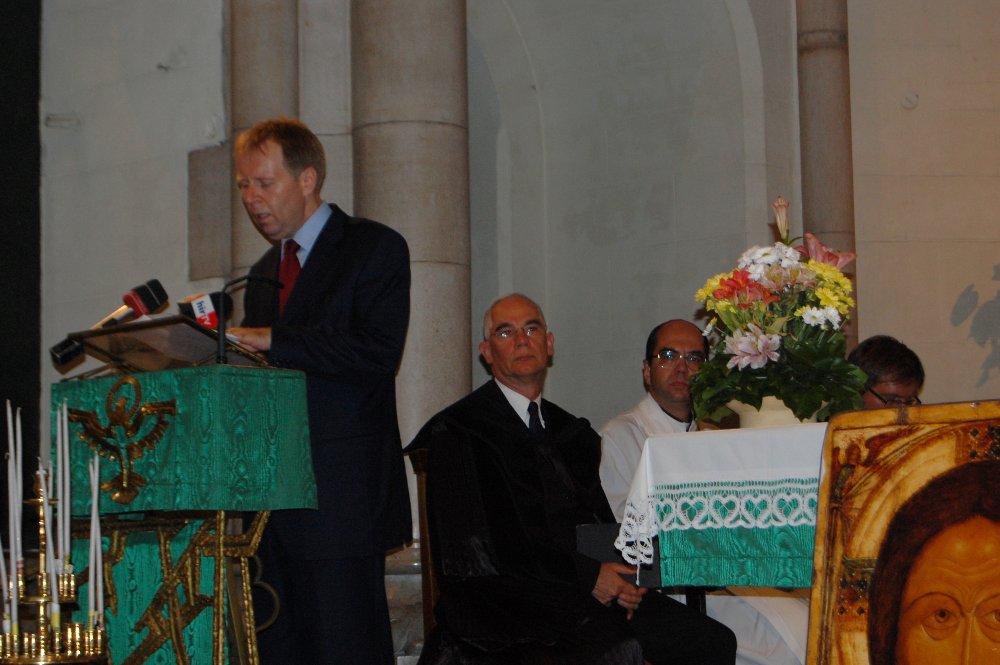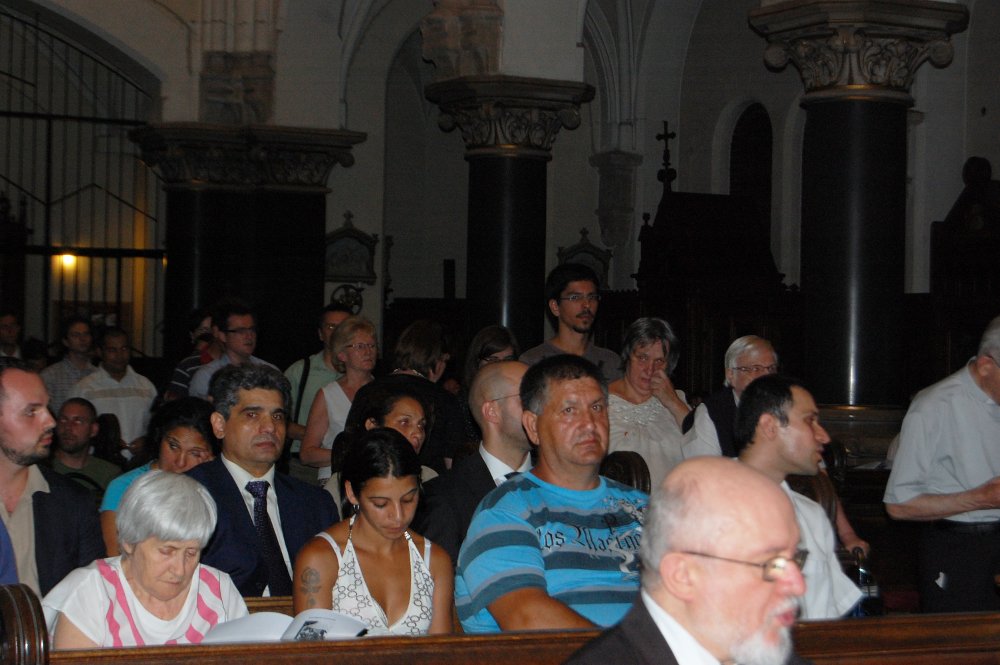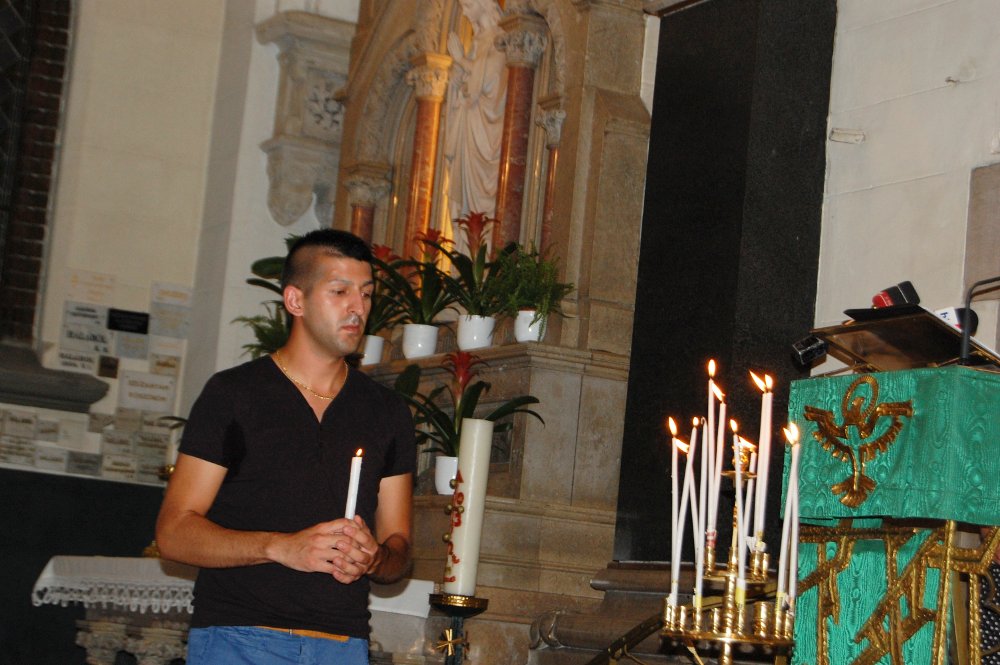 In Budapest, in the church of the Sacred Heart of Jesus, on August 2, the Community of Sant'Egidio held an ecumenical prayer vigil in memory of the victims of the Porrajimos and the murder in Kisléta, where Mária Balog, a woman of Roma ethnicity, was killed three years ago and her 13-year-old daughter was seriously injured. A date that dramatically coincides with the memorial day of the Porrajimos, the holocaust of the Roma, which falls on August 2. In Budapest, in the church of the Sacred Heart of Jesus, on August 2, the Community of Sant'Egidio held an ecumenical prayer vigil in memory of the victims of the Porrajimos and the murder in Kisléta, where Mária Balog, a woman of Roma ethnicity, was killed three years ago and her 13-year-old daughter was seriously injured. A date that dramatically coincides with the memorial day of the Porrajimos, the holocaust of the Roma, which falls on August 2.
The ecumenical prayer was presided over by Msgr. János Székely, auxiliary bishop of Esztergom-Budapest, bishop responsible for the pastoral activity of the Gypsies. It was attended by Tamás Fabiny, Lutheran bishop, Zoltán Balog, pastor of the Reformed Church in Hungary as well as minister of human resources in the current government, and the provincial of the Jesuits in Hungary, P. Tamás Forrai. The relatives of the victims of Kisléta and a few relatives of the victims of other anti-gypsy assaults at Nagycsécs and Tatárszentgyörgy, were also present.
 Before the prayer, they showed the short documentary "Their skin was their sin" (directed by András B. Vágvölgyi) which tells the story of four survivors. Before the prayer, they showed the short documentary "Their skin was their sin" (directed by András B. Vágvölgyi) which tells the story of four survivors.
The vigil was introduced by Péter Péter Szőke, the person responsible for the Community of Sant'Egidio in Budapest, who said: "Prayer is not an escape from reality, but a confrontation with it", and quoting the words by Pope Francis to the young people of the WYD: "The measure of the greatness of a society is determined by the way it treats those most in need ...".
Bishop Székely pointed out in his homily on the Good Samaritan: "the victims' blood cries out to the Lord, not for vengeance, but for mercy. The real question of our life is not that of the doctor of the law: “Who is my neighbour?", but how I can be a neighbour for the others, and behave such as one without setting limits to love".
 Bishop Fabiny prayed for a future in which our children will inherit from us a more beautiful country, more peaceful conditions, where men may reconcile with one another to seek God, the source of life together. Bishop Fabiny prayed for a future in which our children will inherit from us a more beautiful country, more peaceful conditions, where men may reconcile with one another to seek God, the source of life together.
Reformed pastor Zoltán Balog prayed so that the cause of the Gypsies is no longer only a matter for the political struggles and legal acts but the proof overcome by our humanity.
During the ceremony, the episodes related to the series of murders were read, and the faithful lit the candles.
THE DOCUMENT: the attacks on THE Roma in Hungary in recent years
- Shortly after midnight on July 21, 2008, in Galgagyörk, in the Pest region, they shot three houses inhabited by Roma. Several bullets entered through the windows and into the walls of the rooms.
- On August 8, 2008, in Piricse in the region of Szabolcs-Szatmár-Bereg, they threw bottles filled with petrol, inflamed, on a Roma house, and they shot the woman escaping from the house wounding her leg.
- On the night of September 5, 2008, in Nyíradony-Tamásipusztán, 7 adults and 4 children were attacked while they were sleeping in a shack.
- On the night of September 29, 2008 in Tarnabod, they set fire to more houses where old women, a sick couple and an old woman with her son lived in great poverty.
- On November 3, 2008, in Nagycsécs near Miskolc, they shot at two houses. 42-year-old Jozsef Nagy and his sister-in-law, 40-year-old Eva, were killed.
- On December 15, 2008, in the Roma neighborhood of Alsózsolca Severely, they seriously wounded a 19-year-old man, while he was cutting wood in the courtyard of his house.
- On February 22, 2009, in Tatárszentgyörgy in the Pest region, they set fire to a Roma house; they shot dead Róbert Csorba and his 4-year-old son, and they seriously wounded a six-year-old girl while she was trying to escape the flames.
- On April 22, 2009, in Tiszalök, they shot dead Jeno Koka in front of his home on his way to work.
- On the night between the 2nd and the 3rd of August, 2009, in Kisléta, they killed Mária Balogh, a 45-year-old Roma woman, in her sleep, and seriously injured her 13-year-old daughter.
|

